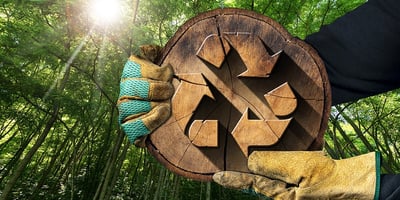More and more, people are turning toward sustainable building methods—and it’s not just within the homebuilding industry. Commercial and industrial construction clients are also looking for ways to create more sustainable buildings.
And one of the best ways to do that? It’s through recyclable materials.
In many instances, builders are searching out materials that they can recycle directly into new builds—like timber, for example. For other types of materials, people are choosing options that, while you may not be able to directly recycle them at the end of their useful life, they can be recycled at the industrial level. Metals and concrete are examples of this type of recycling.
Fasteners are included in the push to use recyclable materials—and that’s what makes SCRAIL® nail screw fasteners, developed by BECK, a great choice for sustainable, recyclable builds. In this post, we’re going to show you the importance of recyclable materials, and we’ll show you how SCRAIL® fits into a recyclable building plan.
Reclaimed Materials
When you’re searching for building materials that can be recycled, there are a couple of broad types of materials to be aware of. Some materials can be recycled directly—and when builders repurpose them in new builds, they’re usually referred to as “reclaimed materials”—while other materials will need to be processed at an industrial recycling facility to create a new product.
In the realm of reclaimed materials, reclaimed timber is one of the more popular options among sustainable builders. In fact, many builders actively seek out sources of reclaimed lumber that they can use to create unique architectural elements—like reclaimed barn wood, or reclaimed flooring from gymnasiums and bowling alleys.
Other materials that are sometimes reclaimed and reused in building projects include bricks and paving stones, linoleum, and both sheet and structural metal so long as it’s still structurally sound and free of corrosion.
Recyclable Materials
It’d be great if you could create new builds entirely out of reclaimed materials, but most new builds, no matter how innovative, will still require some mass-produced materials. However, if you choose wisely, these products can come from recycled sources, and you’ll be able to recycle them again at the end of their useful life.
Concrete is an example of this type of material. You won’t be able to reclaim a concrete foundation from a prior build, for example, but at the end of its useful life, concrete can be pulverized for reuse in concrete aggregates or as crusher dust that can be used as a stable base beneath foundations and roadways.
Other examples of recyclable materials that can be reused after processing include glass, plastics, and different types of plasterboard.
Using Reusable, Recyclable Materials—and Fasteners, Too
Whether you use reclaimed or recyclable materials—or even better, a blend of both—it makes a great selling point for both prospective homeowners and clients in commercial and industrial sectors. That’s because people are looking for environmentally friendlier buildings plus ways to reduce their carbon footprint.
That’s also why SCRAIL® are a great addition to any sustainable build. They offer you the best blend of practicality, durability, and recyclability. We offer a large variety of SCRAIL® for about any use. For example, SCRAIL® SUBLOC® PRO allow you to tackle jobs such as flooring and subflooring with the same ease as using a nail gun—but without the potential for squeaky floors or fasteners that work themselves loose since SCRAIL® products are threaded. You can also use Mini Sheet Coil SCRAIL® fasteners for finish work, or choose another type depending on the job at hand.
Either way, these fasteners are reusable and recyclable. For example, if you need to replace decking boards previously fastened with SCRAIL® nail screw fasteners, you can simply unscrew the fasteners, then reuse them when you place the new boards. At the end of the build’s useful life, SCRAIL® can be recycled along with other metals, which helps keep construction waste out of landfills.
Want to learn more about the benefits of the SCRAIL®? Follow the link below to check out the different varieties of SCRAIL® available.
.svg.png)


